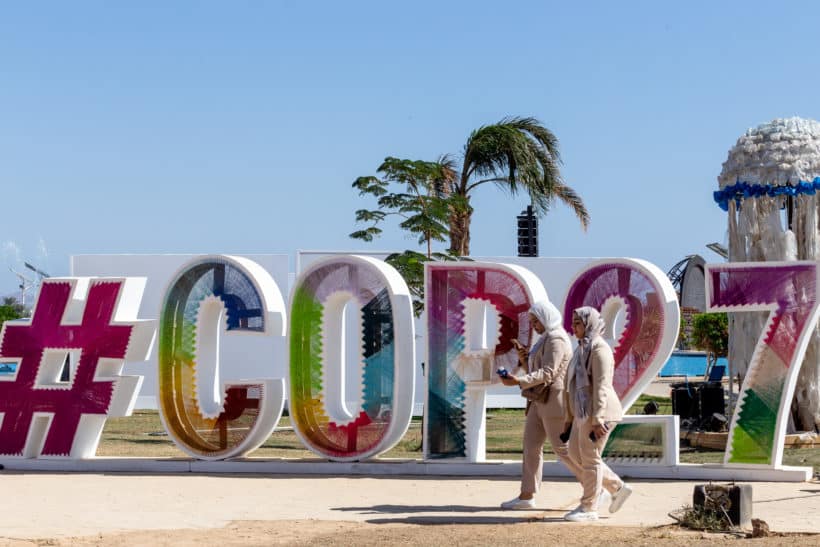
Sharm El–Sheikh, Egypt, 14 November 2022: The hosting of the COP27 conference in Africa signifies a unique opportunity for the continent to assert its needs, challenges and outlooks, and most significantly to drive the African Position on just transition.
Historically this conference, focused on climate change and its humanitarian ramifications, has marginalized Africa – whose contribution to humanity’s carbon footprint is minimal but whose people are suffering disproportionately from its effects.
But with this year’s gathering of world leaders occurring in Egypt’s Sharm El Sheikh, it is vital that Africa’s authentic voice is heard – this is the overriding purpose of Afreximbank’s mission at COP27. By inserting and asserting our perspective in the global climate change debate, we want to promote a mainstream African position, as a key stakeholder region.
Africa’s situation, and therefore the position articulated by Afreximbank, diverges from those of many other regional blocs, particularly in the more prosperous Global North. This continent’s long-term sustainable development agenda, which relies on traditional energy sources, is impeded by the ongoing campaign towards zero-carbon emissions, and the short-term livelihoods of millions of Africans are imperiled by a headlong rush towards net-zero.
With this in mind, Afreximbank’s participation in COP27 revolves around three core elements: an accelerated implementation of the African Continental Free Trade Agreement AfCFTA, which can reduce the continent’s reliance on carbon-intensive imports; the fostering of partnerships to promote an energy transition model that is more globally inclusive; and the maintenance of a pan-African position which achieves a balanced, environmentally sustainable economic development strategy.
So, in partnership with likeminded organisations, Afreximbank’s participation at COP27 has been marshalled to articulate the following outcomes:
- Calling for the full Implementation of the AfCFTA towards the localization of industries to transition towards net zero emissions:
Afreximbank believes that the AfCFTA offers an opportunity for Africa to produce and consume goods within the continent, thereby reducing its carbon footprint. Erasing borders offers an opportunity for Africa to share technology, collaborate on science, and leverage its youthful population to achieve the development the continent warrants. In understanding this, Afreximbank supports the full implementation of the AfCFTA – which will help the continent pool resources to accelerate and speed up its development trajectory.
At the COP27 conference, Afreximbank is rallying member states and development partners to accelerate the implementation of the AfCFTA. In so doing, Afreximbank called on these organisations and Governments to fund the AfCFTA Adjustment Fund. Capital from this Fund will be deployed to support both the public and private sectors to address short-term disruptions, while enabling the private sector to retool, reskill, and develop the necessary capabilities to produce value-added goods and services that can be traded competitively within the continent – catalysing the emergence of AfCFTA-led regional value chains.
- Fostering partnerships for an energy transition model that is more globally inclusive:
Currently, 600 million Africans have no access to electricity, while another 900 million lack access to clean cooking. However, Africa, a continent endowed with abundant resources, is home to 30 percent of the world’s mineral reserves, eight percent of the world’s natural gas, and 12 percent of the world’s oil reserves.
Due to its low levels of development and large green energy sources, Africa emits the least of any region, contributing about 4 percent of total global emissions. Afreximbank believes that Africa must use its vast minerals to tackle the continent’s energy poverty and achieve its development plans under Agenda 2063. Exploring Africa’s natural gas reserves can double the continent’s electricity capacity, while adding less than one percent to global emissions.
At Afreximbank, we believe Africa cannot achieve its development plans without access to energy. Hence Africa has the right to develop its resources, including fossil fuels, and we, as a Bank, are prepared to finance the continent’s energy just transition. At the conference, Afreximbank has confirmed its intention and willingness to continue to partner with petroleum producers to promote adaptation, support energy value chains and mitigate the costs of transition.
With a well-articulated African position, we believe the continent’s economic development will be well positioned to grow while ensuring the continent’s energy transition progress is compatible with, and complementary to, the Sustainable Development Goals (SDG) as well as the continent’s long-term social and environmental objectives, as set out in African Union’s Agenda 2063: The Africa We Want.
- Supporting the common pan-African position around a balanced, environmentally sustainable, and responsible economic development strategy:
If our continent is to achieve sustainable development goals, we must take charge of its trajectory. Africa is blessed with rich mineral resources enough to finance its development, but the continent has failed to benefit from the exploitation of these resources. Afro-centric institutions are key to driving Africa’s economic agenda and building Africa’s resilience against climate change. Afreximbank has committed to supporting the African positioning for the continent’s benefit. At this critical time of global economic uncertainty, it is imperative that Africa coordinates and supports the common African position on economic development amidst global climate change. At the conference, Afreximbank is calling for adaptation financing models prioritising resilience in economies and ecosystems, in place of green financing models for mitigation – as this will generate new nomenclature bonds befitting the African situation. Moreover, Afreximbank has called for compensation for loss and damage and a transition from transactional to systemic finance – both crucial for our collective future.

